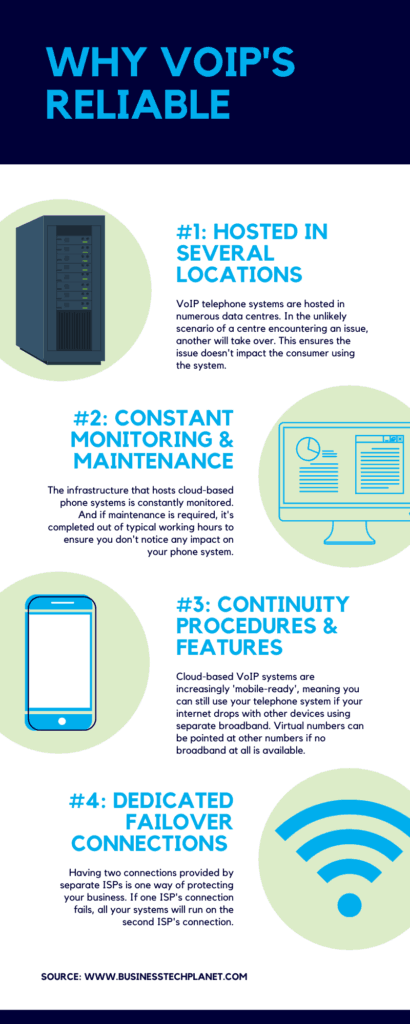According to a 2019 BrightLocal report, 60% of consumers want to call small local businesses on the phone. On the other hand, only 16% of consumers would send the business an email. This statistic clearly demonstrates the importance of having a reliable phone system for your business. As businesses gradually move over to cloud-hosted telephone systems, it’s only natural to wonder how reliable cloud-hosted systems are.
Are VoIP phone systems reliable? Yes, VoIP phone systems are reliable. Assuming you have a suitable internet connection, you will experience high-quality calls with 99.9% uptime.
So, you can expect 99.9% uptime with a good provider. While that answers the question of whether VoIP phone systems are reliable or not, it doesn’t tell us why VoIP systems are reliable. Throughout the rest of this blog post, I’ll explain why VoIP systems are reliable and how providers ensure reliability for businesses such as yours.
Why Is VoIP So Reliable?
Although VoIP reliability differs based on several factors, most providers sell their VoIP solution with an advertising point of 99.9% uptime. Providers clearly know they can guarantee this uptime, or service-level agreements wouldn’t exist. So, how are VoIP providers ensuring 99.9% uptime for consumers?

Hosted In Several Secure Data Centres
Cloud-based phone systems are hosted in secure data centres. However, what happens in the unlikely situation that a data centre goes down?
Top VoIP providers host their cloud-based phone systems across multiple data centres in several locations. If one data centre had a problem, another centre would take over to ensure your phone system continues to work correctly. This automatic failover offers vital protection for both providers and consumers, because who knows when something could go wrong?
By using multiple data centres, providers can ensure that phone systems continue to work as usual regardless of the status of individual data centres. If a data centre did go down, you wouldn’t notice any impact at all on the way your VoIP system works as another centre takes over.
Before going with a VoIP provider, make sure you ask about how they can help you avoid losing your phone system functionality should their data centres encounter an issue. Many providers offer several solutions that can ensure you never miss a call, no matter what happens. I’m going to explain some of these solutions later in my post.
Constant Monitoring and Out-Of-Hours Maintenance
The infrastructure that hosts cloud-based phone systems is constantly monitored. And if maintenance is required, it’s completed out of typical working hours to ensure you don’t notice any impact on your phone system.
The biggest VoIP providers will likely host thousands of business VoIP telephone systems. As a result, they have massive teams of monitoring and maintenance technicians ensuring everything works as it should do.
You can rest assured that VoIP providers use reliable data centres to host their cloud-based telephone systems. Data centres typically use some form of an environmental monitoring system that flags up any faults before they impact hosted services, such as VoIP.
Continuity Procedures and Features
Many VoIP providers can put continuity procedures and features into place to protect your business in the unlikely event of your VoIP telephone system being unavailable.
Despite VoIP telephony’s increasing popularity, businesses do worry about losing their phone system due to their internet dropping. As you’re probably aware, a VoIP telephone system will not work without the internet. Fortunately, cloud-based VoIP systems are increasingly ‘mobile-ready’, meaning you can still use your telephone system if your internet drops.
All the call functionality of VoIP systems are available through laptops, PCs and most importantly, mobile phones. Features such as call transfers and call holding can be used via mobile and desktop applications. Essentially, if your office internet connection drops, you can use mobile broadband to ensure you don’t miss any important calls.
What happens if your VoIP telephone system is unavailable, due to a fault on your provider’s side? All hope isn’t lost where virtual numbers are concerned. On several occasions in the past, we have found ourselves in a position where the VoIP system we use has been unavailable. In these situations, we have been able to point our virtual numbers at mobile phone numbers, enabling us to continue making and receiving calls. Good providers can help you sort this out, so you’re protected whether your internet fails or your VoIP system.
Failover Connections Dedicated To Business Continuity
Depending on your budget, your provider may install a second failover connection purely dedicated to protecting your business should your main connection fail.
You might see a second internet connection as an unnecessary cost. However, how much would it cost your business if you had to go without your internet connection for hours, or perhaps days? That’s why, if you can afford it, providers will install two separate connections for you.
Having two connections provided by separate ISPs is one way of protecting your business. If one ISP’s connection fails, all your systems will run on the second ISP’s connection. Some businesses have three connections: two from their favoured ISP, and one from a second ISP in case their primary connections fail altogether.
If your primary internet connection fails, a second internet connection provides your business with near-complete VoIP continuity. You won’t lose your essential telephone system, no matter what happens to your internet connection.

Is VoIP More Reliable Than Traditional Telephony?
Landlines are known for their reliability, with call quality and lack of outages particularly notable. However, landlines are becoming obsolete and are no longer meeting the needs of consumers. There’s a general consensus in the telecom industry that VoIP is a much more reliable option – and VoIP systems are only getting better.
VoIP systems have been getting better for years and they’ve now reached the point where they’re better than landlines. VoIP systems are ever-improving, however, with no signs of slowing down yet. As you may have heard, BT is aiming to shut down the traditional ISDN/PSTN network by 2025 latest. This decision has meant a much greater focus by all providers on improving VoIP.
VoIP systems can be used to make and receive calls on broadband, 3G, 4G and now 5G. With the ability to make and receive high-quality calls on all these different connections, VoIP is evidently more reliable and future-proof than traditional telephony.
Since its invention, VoIP has consistently evolved. All signs suggest that VoIP will continue to evolve for many years to come as we head closer to unified communications. It’s worth reiterating that VoIP will continue improving for many years since the telecom sector is investing heavily and will do so long-term.
Conclusion
VoIP is evidently far superior to traditional telephony. A VoIP system is an incredibly reliable option, suitable for a business of any size. If you have any other reasons that VoIP is so reliable, I’d love to hear them! Share your reasons below in the comments.
